Classic style will never be out of fashion. I’ve been writing about fashion for many years, and something that I always tell my readers is that your best investment is classic style. It’s all about selecting pieces that are good-looking today and will continue to look fabulous five years down the line.
When I consider classic style, I think of those ladies who always appear put-together without overdoing it. They possess that effortless beauty that results from having a clue as to what’s working and adhering to it.
Table of Contents
What is Classic Style?
Timeless style is all about pieces that won’t ever be out of style. It’s not following all of the trends or purchasing the newest hot thing. Rather, it’s creating a wardrobe of quality pieces that complement each other.
Clean lines, neutral colors, and properly constructed clothing characterize classic style. It’s the antithesis of fast fashion. These are pieces you’ll turn to again and again.
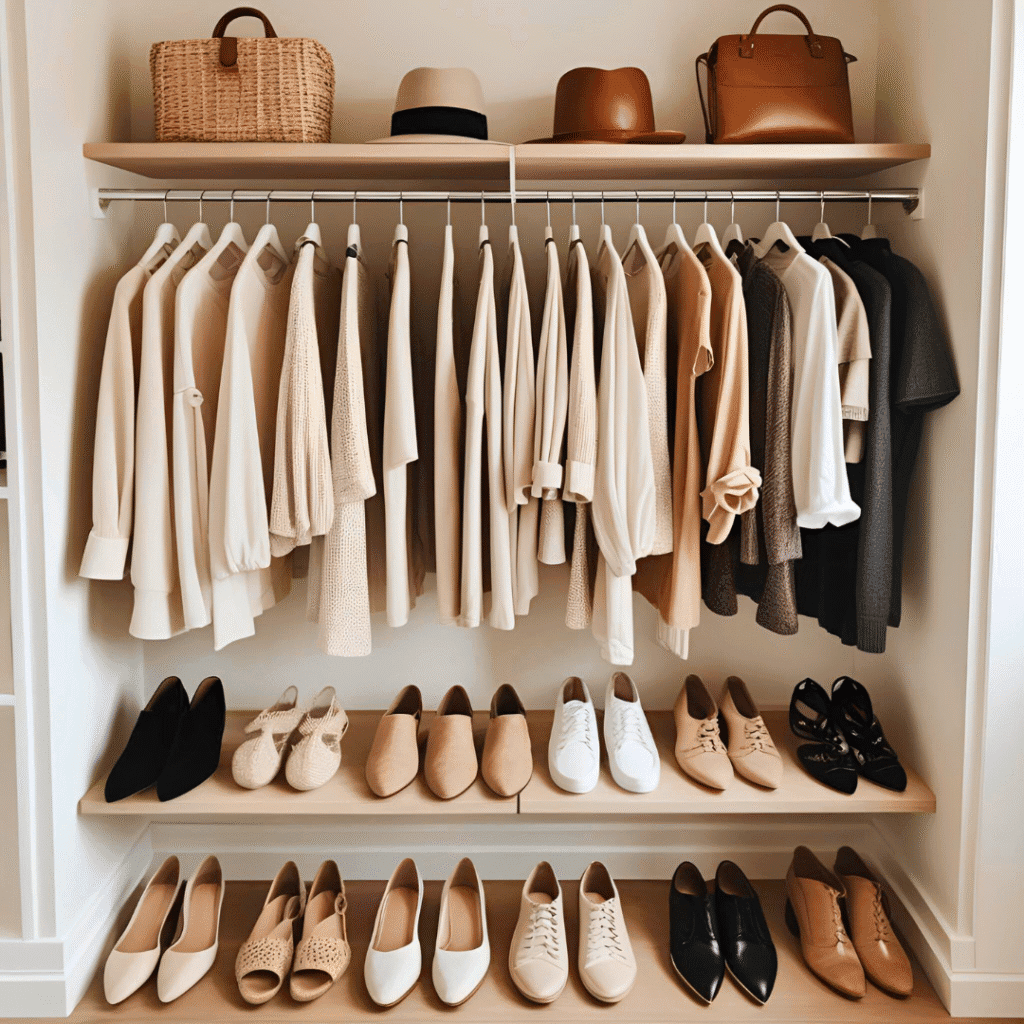
The elegance of classic style is that it’s simple. You don’t require a large wardrobe to be stylish. You just need the right items that can be mixed and matched.
Classic Style Icons Throughout History
There are some women who have achieved so much in classic style that they turned into icons. Let me tell you about a few who keep inspiring me:
Audrey Hepburn taught us that less is more. Her little black dress in “Breakfast at Tiffany’s” is still imitated today. She demonstrated that timeless items like ballet shoes, cropped trousers, and boat neck blouses never fade away.
Grace Kelly was the epitome of classy simplicity. She dressed in crisp dresses, pearls, and organized handbags. Her look was refined but never excessive.
Coco Chanel designed some of the classics we still wear today. The little black dress, the quilted purse, and the traditional suit all were born out of her concept of classic style.
Jackie Kennedy popularized classic American style globally. Her shift dresses, large sunglasses, and strand of pearls were her trademark.
These ladies knew that classic style isn’t dull. It’s about discovering what works and owning it.
Classic Style Characteristics
What is “classic”? I’ve seen these characteristics in all truly classic pieces:
Quality Over Quantity
Classic items are well constructed. They have good material and long-lasting construction. You may spend more initially, but cost per wear actually decreases.
Neutral Color Palette
Classic fashion adheres to colors such as black, white, navy, beige, gray, and cream. These colors complement each other and never go out of style.
Clean Lines and Simple Silhouettes
Classic items have clean lines without an excess of details. Consider straight-leg jeans, A-line dresses, and fitted jackets.
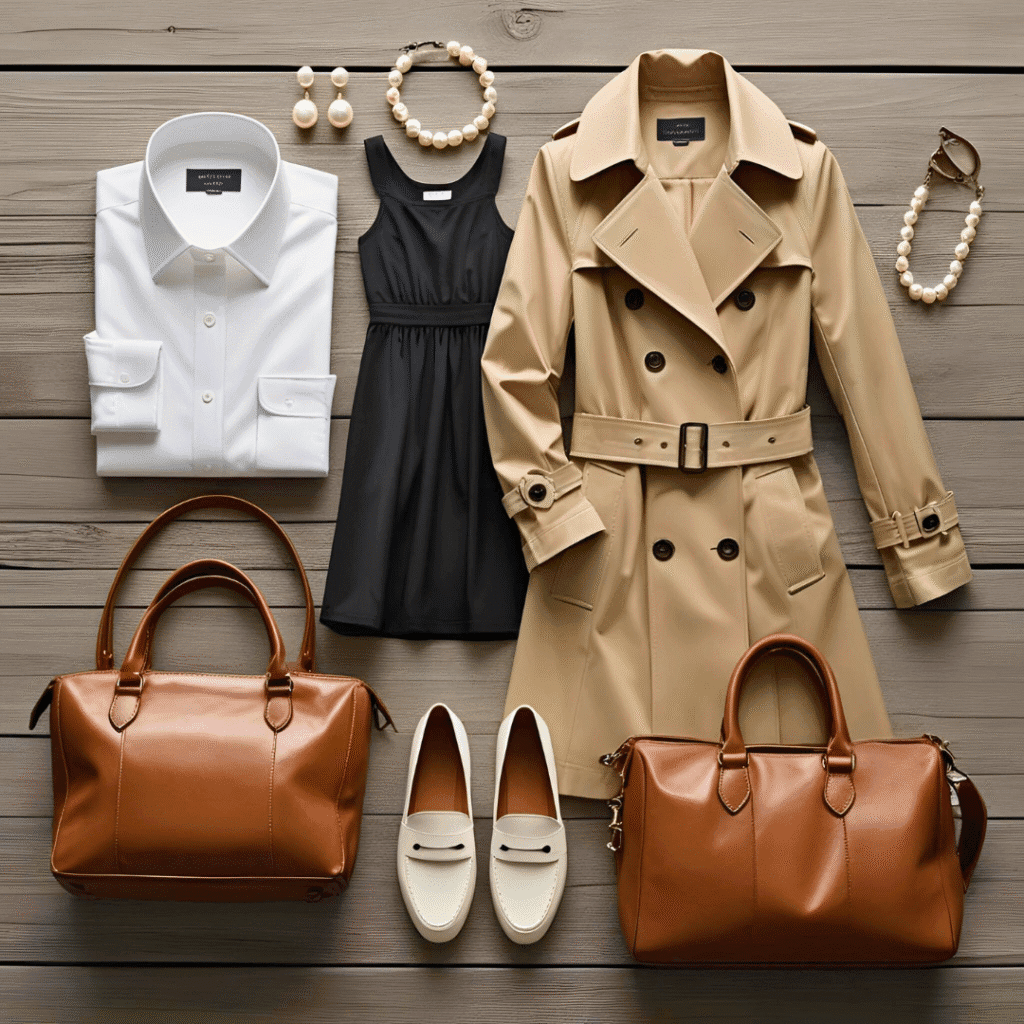
Timeless Appeal
These items are just as stylish today as they were 20 years ago. They don’t shout any specific decade or style.
Versatility
Classic items are suitable for various situations. You can dress them up or down based on how you wear them.
Quality Materials
Natural fibers such as cotton, wool, silk, and linen are timeless choices. They wear better and look better than their synthetic counterparts.
How to Dress Classic Style
Dressing in a classic style does not have to be boring or old-fashioned. This is how I suggest doing it:
Start with the Essentials
Base your wardrobe on staples. A white button-down shirt, good-fitting jeans, a blazer, and a little black dress are excellent places to begin.
Pay attention to Fit
Nothing is timeless if it does not fit well. Have your clothes fitted by a tailor if necessary. Good fit causes even cheap items to seem more valuable.
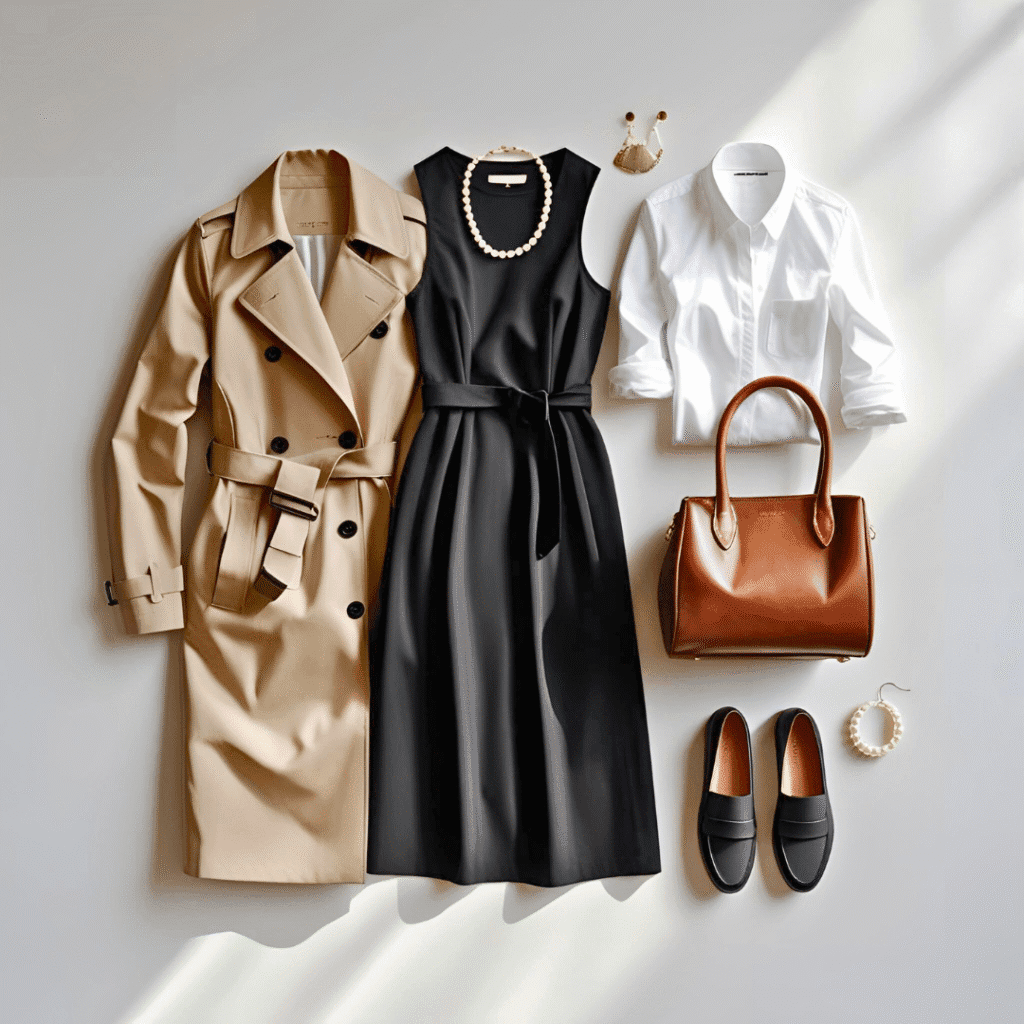
Keep Accessories Low-Key
Invest in quality accessories rather than stylish ones. Good leather purse, timeless watch, and plain jewelry go with everything.
Stick to Your Color Palette
After discovering colors that suit you, stay true to them. This simplifies dressing and makes all the pieces coordinate.
Invest in Quality Shoes
Quality shoes can make any outfit look refined. Timeless classics such as pumps, loafers, and knee-high boots are an investment.
Knowing what kind of clothing is what helps you make quality decisions. Understanding different types of clothing helps you make better choices when building your classic wardrobe.
What Isn’t Classic Style
Let me be explicit about what classic style ISN’T:
Trendy Pieces
If something is extremely trendy at the moment, it’s likely not classic. Classic pieces don’t catch on for a bit and then suddenly fade away.
Overly Embellished Pieces
Too much sequin, beading, or other embellishments are not typically classic. Less is more.
Extreme Silhouettes
Super skinny pants, very wide-leg pants, or very short mini skirts are not classic. These fads rise and fall.
Logo-Packed Pieces
Some designer items can be classic, but anything lined with logos typically is not. Classic style is understated.
Uncomfortable Pieces
If you can’t walk around easily or the material is cheap-feeling, it’s not classic. Quality and comfort exist hand in hand.
Classic Style in the Real World
Classic style appeals for every part of your life. Here’s how I incorporate it in different situations:
At Work
For work, classic style is perfect. It looks professional without being stuffy.
What I wear:
- Tailored blazers in navy or black
- Pencil skirts or straight-leg pants
- Button-down shirts in white or light blue
- Closed-toe pumps or professional flats
- Simple jewelry like stud earrings or a delicate necklace
Why it works: Classic workwear looks polished and appropriate. You won’t have to worry about whether your outfit is too casual or too formal.
When choosing pants, knowing what is inseam helps you get the perfect fit for a professional look.
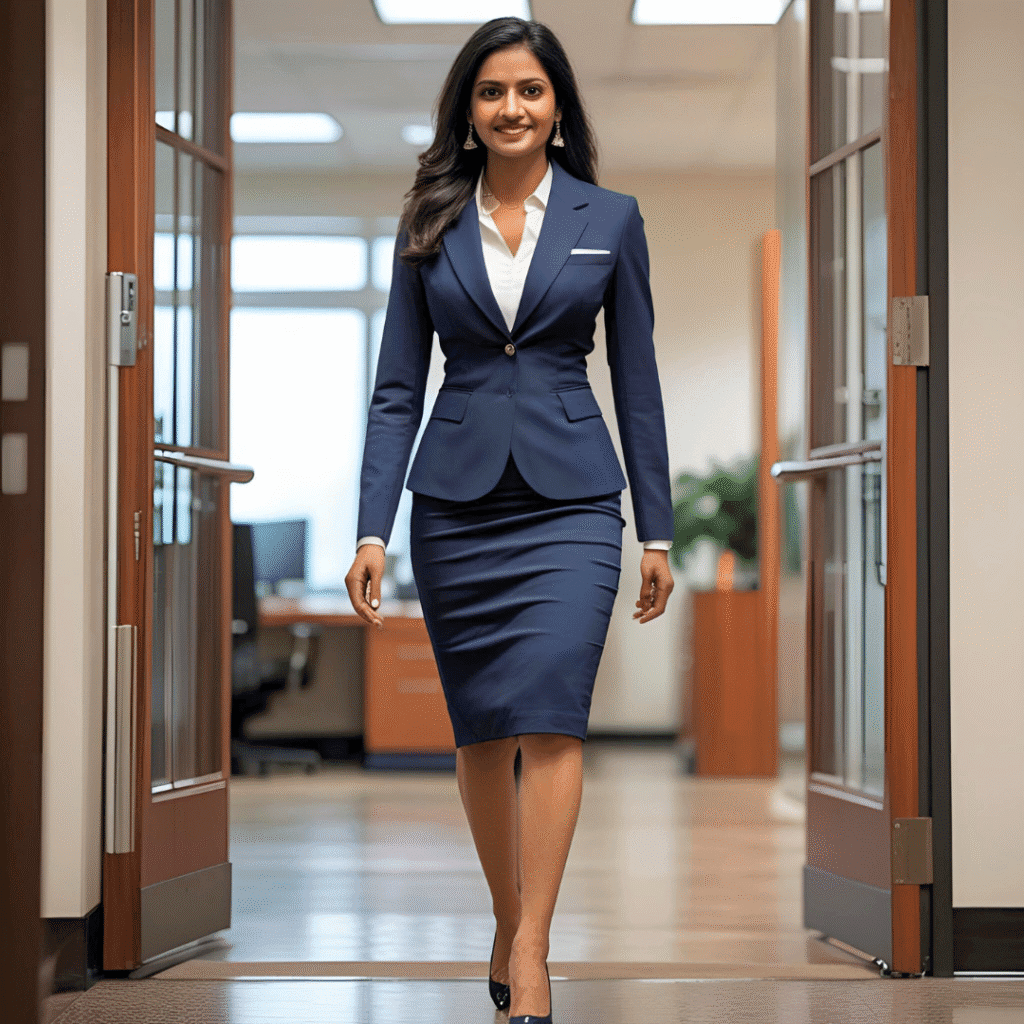
On the Weekends
Classic style for weekends is about looking put-together while being comfortable.
What I wear:
- Well-fitted jeans or chinos
- Cashmere sweaters or cotton tees
- White sneakers or loafers
- A structured tote bag or crossbody
- Minimal makeup and simple hairstyles
Why it works: You look effortlessly stylish without trying too hard. Classic weekend wear is comfortable enough for daily activities but polished enough for unexpected encounters.
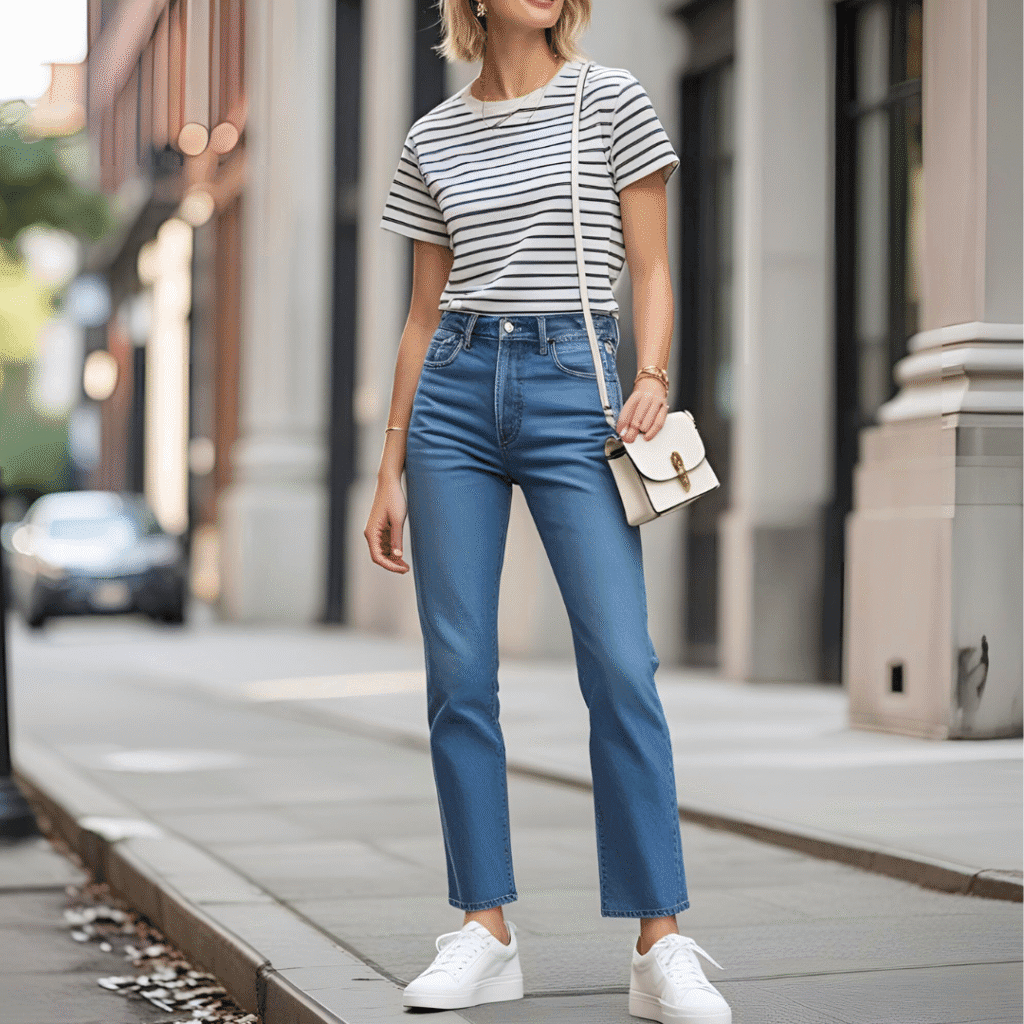
For a Night Out
Classic style for evening is about elegance, not flashiness.
What I wear:
- The little black dress or nice pants with a silk blouse
- Classic heels or elegant flats
- A small clutch or structured handbag
- Simple but quality jewelry
- A tailored coat or wrap
Why it works: You’ll never feel overdressed or underdressed in classic evening wear. It’s sophisticated and timeless.
If you’re wondering what color shirt goes with olive green pants, classic colors like white, cream, or navy always work beautifully.
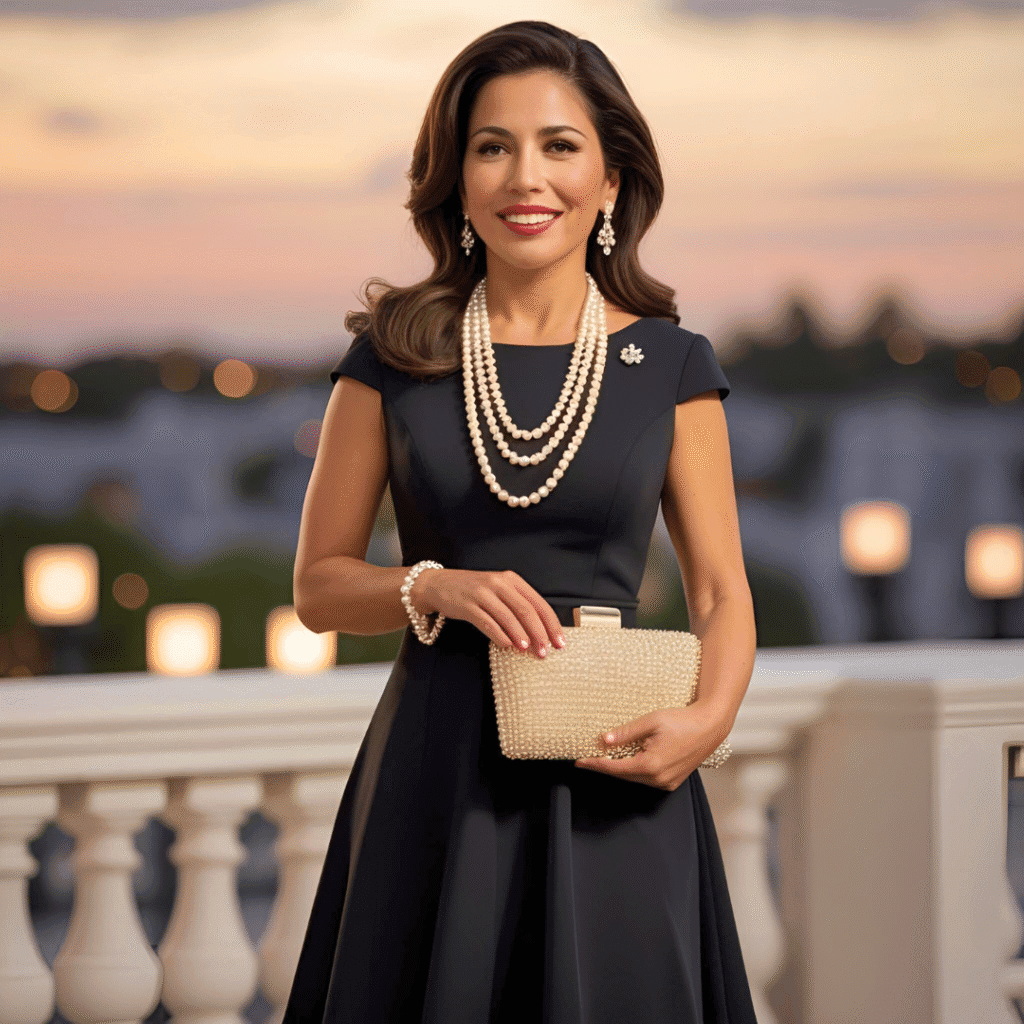
Things to Avoid When Creating a Classic Wardrobe
I’ve made my share of mistakes over the years. Here are the biggest ones to avoid:
Don’t Buy Everything at Once
Building a classic wardrobe takes time. Buy quality pieces gradually instead of trying to get everything immediately.
Don’t Follow Every Trend
Just because something is popular doesn’t mean it belongs in your classic wardrobe. Stick to timeless pieces.
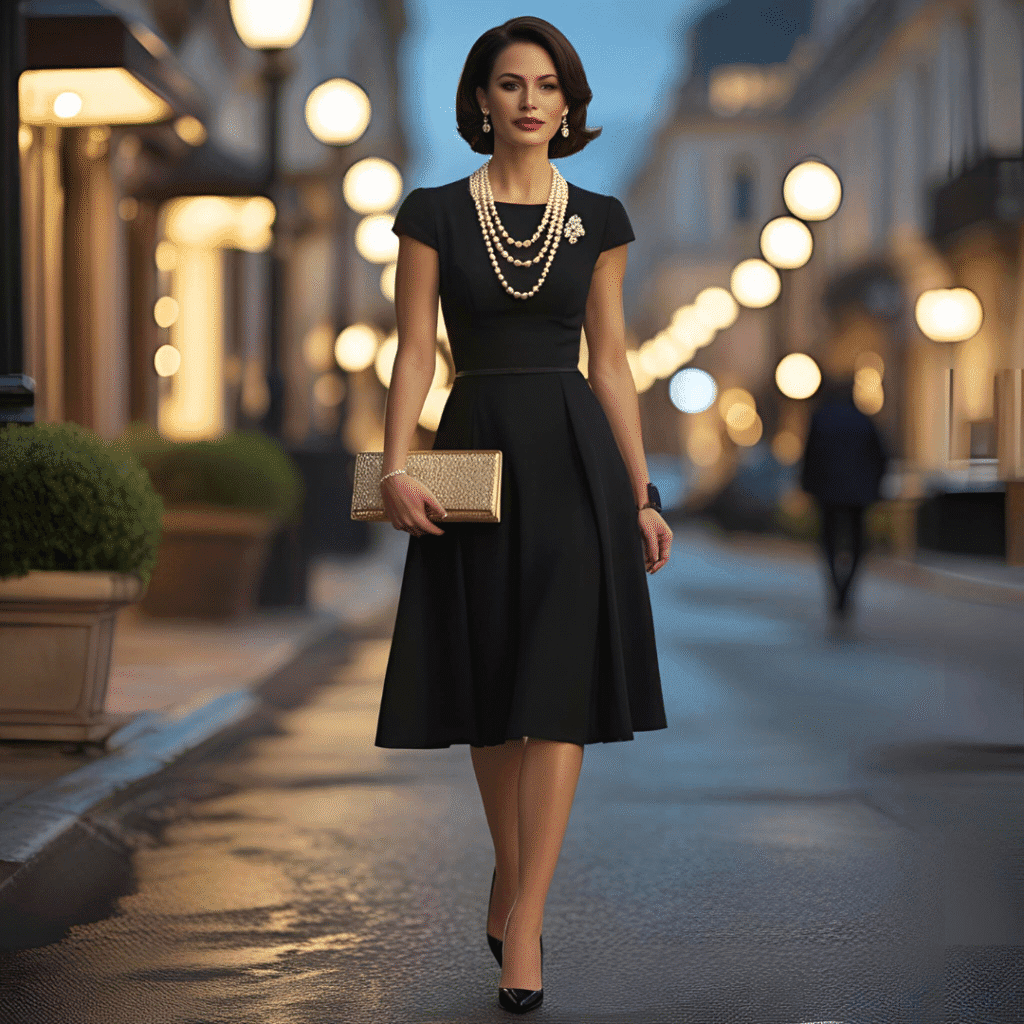
Don’t Ignore Fit
A cheap, well-fitted piece looks better than an expensive, poorly-fitted one. Always consider alterations.
Don’t Forget About Lifestyle
Your wardrobe should match your actual life, not the life you think you want. Be realistic about what you’ll actually wear.
Don’t Skimp on Undergarments
Good bras, shapewear, and undergarments are the foundation of any classic look. They’re worth the investment.
Don’t Overcomplicate It
Classic style is about simplicity. Don’t overthink every outfit or try to make bold statements with every piece.
Classic Capsule Wardrobe Options
A capsule wardrobe makes getting dressed easier. Here are six different approaches to classic capsule wardrobes:
Option 1: The Minimalist (20 pieces)
Perfect for someone who wants the absolute basics:
- 2 pairs of well-fitted pants (black and navy)
- 2 blazers (navy and gray)
- 3 button-down shirts (white, light blue, striped)
- 2 sweaters (cashmere in neutral colors)
- 1 little black dress
- 2 pairs of shoes (black pumps, comfortable flats)
- Basic accessories
Option 2: The Professional (30 pieces)
Great for office workers:
- 4 blazers in different colors
- 6 blouses and button-downs
- 4 pairs of pants and 2 skirts
- 2 dresses suitable for work
- 3 pairs of professional shoes
- Work-appropriate accessories
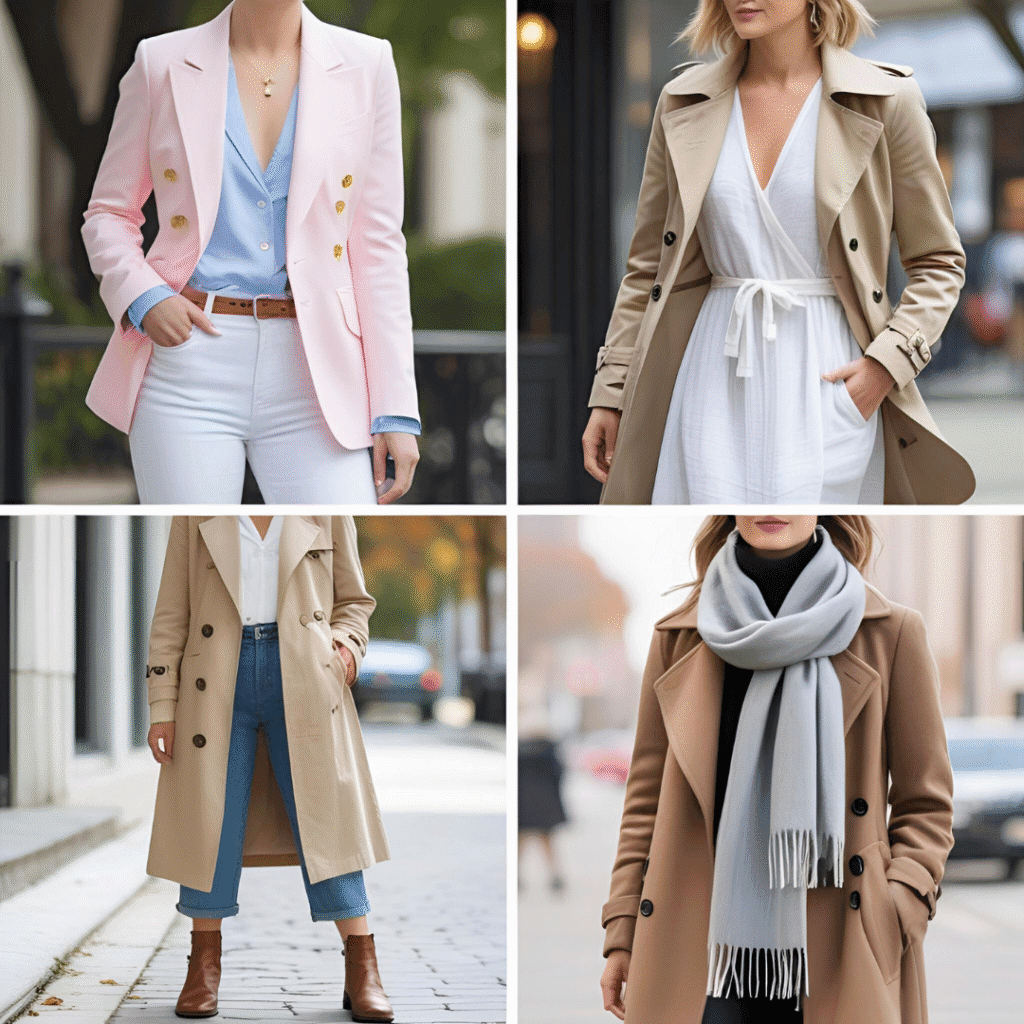
Option 3: The Busy Mom (35 pieces)
Practical but polished:
- Comfortable but stylish jeans and pants
- Easy-care tops that look put-together
- Cardigans and layers for quick outfit changes
- Comfortable shoes that still look good
- Versatile dresses for different occasions
Option 4: The Retiree (25 pieces)
Comfortable and elegant:
- Quality knitwear and comfortable fabrics
- Easy-to-wear pieces that don’t require much maintenance
- Comfortable but stylish shoes
- Accessories that add personality
- Pieces suitable for travel
Option 5: The Student (20 pieces)
Budget-friendly classics:
- Good-quality basics that mix and match
- Versatile pieces that work for different activities
- Comfortable shoes for walking
- A few dressier pieces for interviews or presentations
- Accessories that add personality
Option 6: The Creative Professional (40 pieces)
Classic with personality:
- Classic basics with interesting details
- Quality pieces that can be styled in different ways
- Shoes that are both comfortable and stylish
- Accessories that express personal style
- A mix of casual and professional pieces
How to Welcome Classic Fashion
Welcoming classic fashion is a process, not a place. Here’s how I suggest you begin:
Begin with One Piece
Choose one timeless piece you adore and start there. Perhaps it’s a flawless white button-down or a classic, tailored blazer.
Prioritize Quality
Buy what you can afford that’s of the best quality. One well-tailored piece is worth more than three cheap ones.
Think About Your Lifestyle
Your closet should serve your real life. Don’t purchase ball gowns if you don’t go to formal affairs.
Learn from Icons
Investigate women with style that you would like to imitate. What are items that they wear again and again? What makes their looks functional?
Be Patient
It takes time to create a classic wardrobe. Do not hurry through the process or force yourself to have everything at once.
Trust Your Instincts
Classic does not equal boring. Pick items that make you feel good and comfortable.
Classic Style Tips & Tricks
Here are my top five tips for mastering classic style:
Tip 1: The Rule of Three
Limit yourself to three main colors in any outfit. This keeps things cohesive and classic.
Tip 2: Invest in Tailoring
A good tailor is your best friend. Even inexpensive pieces look expensive when they fit perfectly.
Tip 3: Choose Quality Fabrics
Natural fabrics like cotton, wool, and silk age better than synthetics. They also feel better against your skin.
Tip 4: Keep it Simple
When in doubt, go simpler. Classic style is about restraint and elegance, not making bold statements.
Tip 5: Build Gradually
Don’t try to transform your wardrobe overnight. Add one or two classic pieces each season and build from there.
Classic Fashion Must-Haves by Category
Tops
- White button-down shirt
- Black turtleneck
- Cashmere sweater
- Silk blouse
- Well-fitted t-shirts in neutral colors
Bottoms
- Dark wash straight-leg jeans
- Black dress pants
- A-line skirt in a neutral color
- Tailored shorts for summer
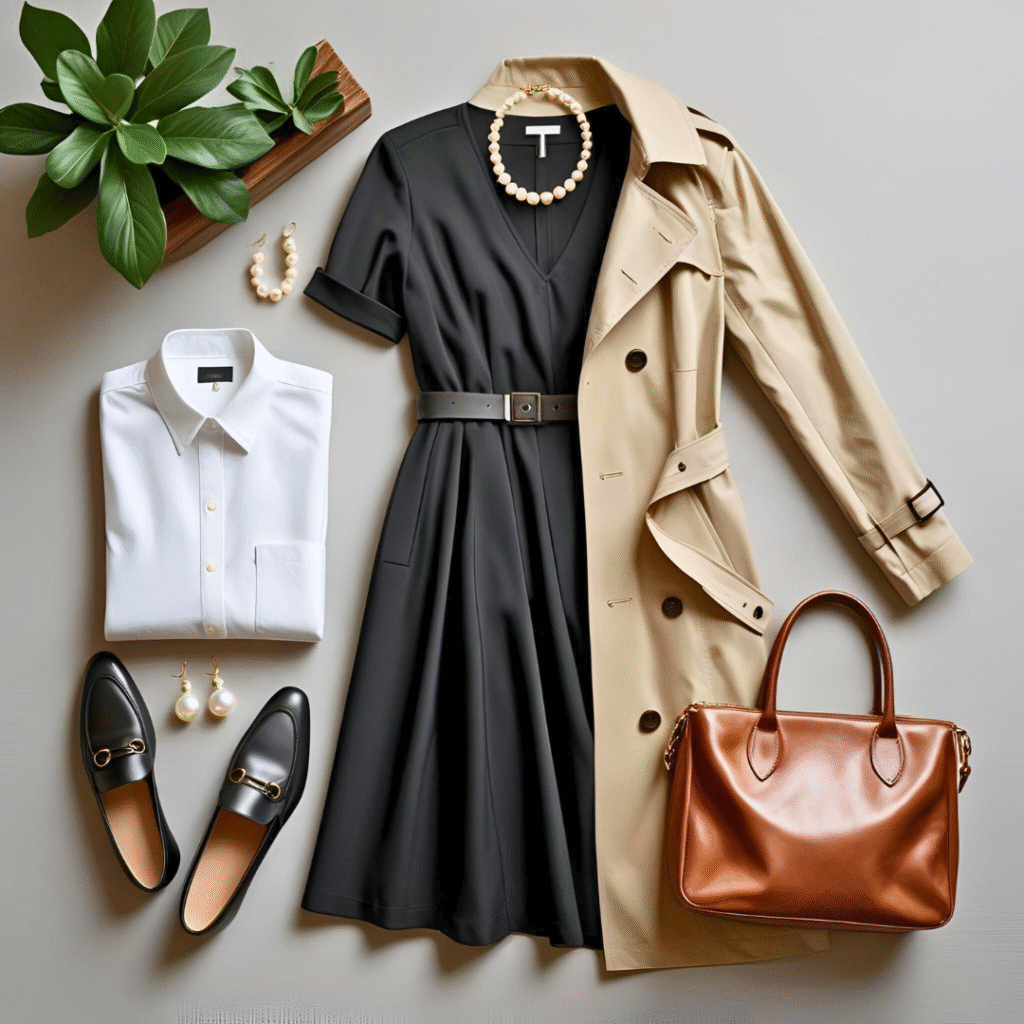
Dresses
- Little black dress
- Wrap dress in a solid color
- Shirt dress
- Simple sheath dress
Outerwear
- Tailored blazer
- Trench coat
- Wool coat for winter
- Denim jacket
- Cardigan sweater
Shoes
- Black pumps
- Comfortable flats
- White sneakers
- Knee-high boots
- Simple sandals
Accessories
- Leather handbag in a neutral color
- Simple watch
- Pearl or gold jewelry
- Classic sunglasses
- Quality belt
Seasonal Classic Style
Classic style adapts to seasons without losing its timeless appeal:
Spring
Focus on lighter fabrics and fresh colors within your neutral palette. White jeans, cotton blouses, and lightweight cardigans work well.
Summer
Choose breathable fabrics like cotton and linen. Simple sundresses, comfortable sandals, and lightweight blazers are perfect.
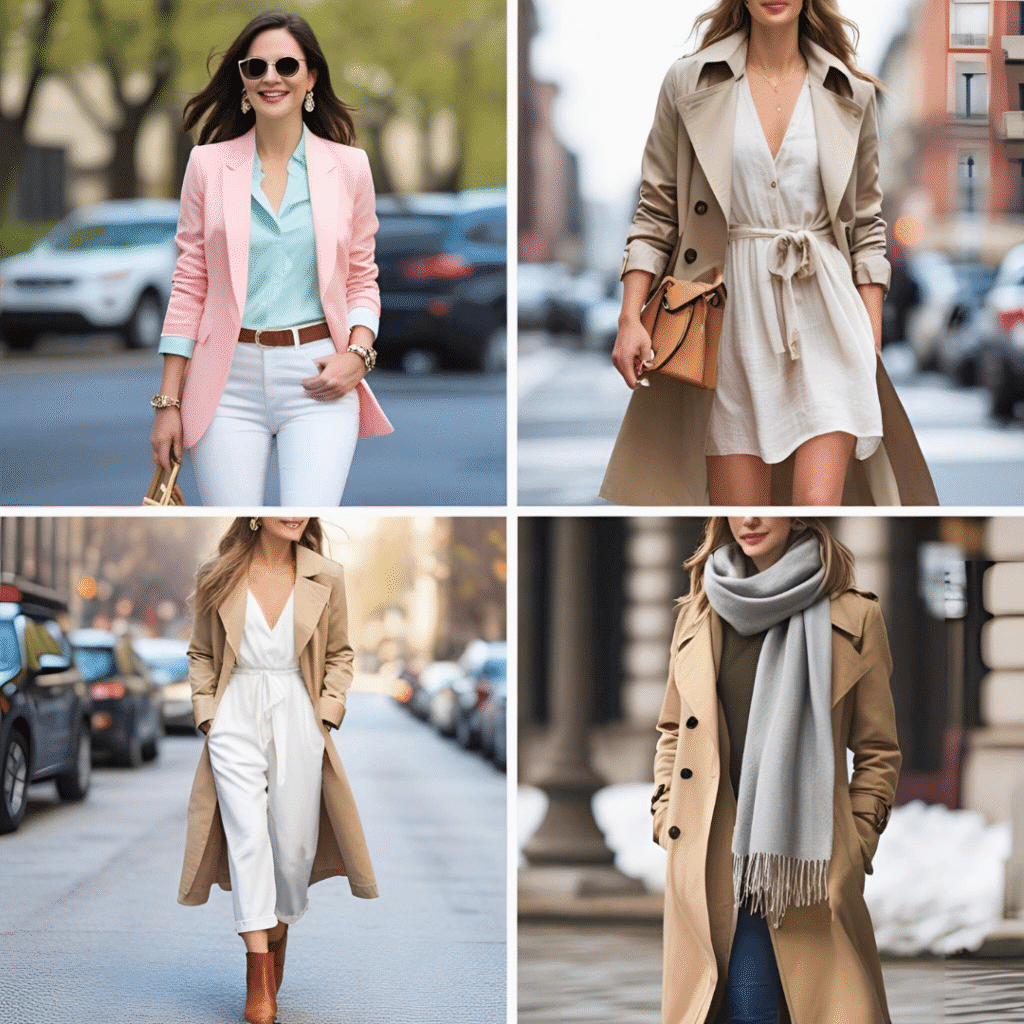
Fall
Layer with sweaters, boots, and scarves. This is when classic style really shines with its versatility.
Winter
Invest in quality outerwear like wool coats and cashmere scarves. Boots and warm accessories complete the look.
Classic Style on a Budget
You don’t need to spend a fortune to achieve classic style:
Shop Your Closet First
You might already own classic pieces. Look for items with clean lines and neutral colors.
Invest Strategically
Spend more on pieces you’ll wear often, like a good coat or quality jeans. Save on items that get less wear.
Look for Quality at Lower Prices
Stores like Uniqlo, Everlane, and COS offer well-made basics at reasonable prices.
Care for What You Have
Proper care makes clothes last longer. Follow care instructions and invest in good hangers and storage.
Consider Secondhand
Vintage and consignment stores often have classic pieces in great condition for less money.
Building Your Classic Color Palette
A cohesive color palette makes getting dressed easier and ensures everything works together:
Start with Neutrals
Build your foundation with black, white, navy, beige, and gray. These colors work with everything.
Add One or Two Accent Colors
Choose colors that flatter you and work with your neutrals. This might be burgundy, forest green, or camel.
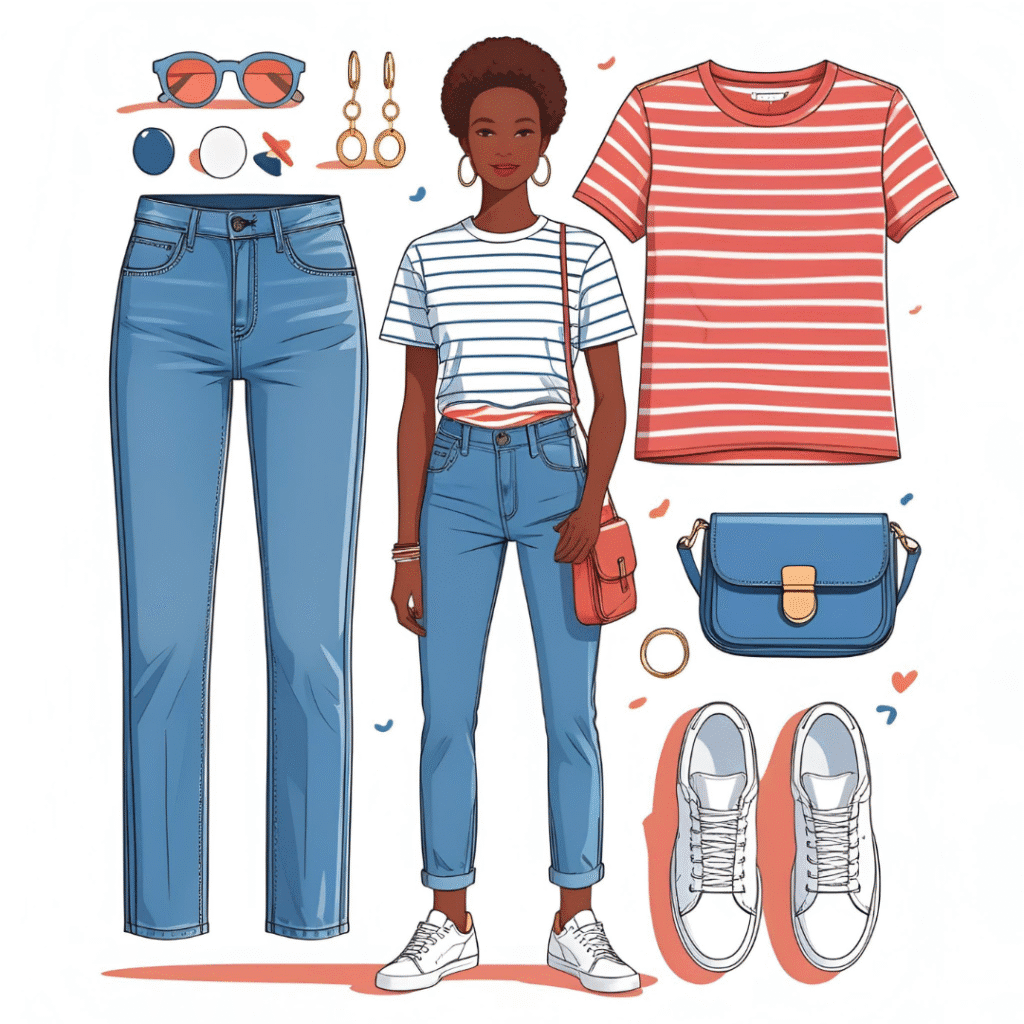
Consider Your Skin Tone
Some colors look better on you than others. Stick to the ones that make you look healthy and vibrant.
Keep it Consistent
Once you find colors that work, stick with them across all categories of clothing and accessories.
According to Vogue, classic style never truly goes out of fashion because it focuses on quality and timelessness rather than trends.
Classic Style Mistakes to Avoid
Even with the best intentions, it’s easy to make mistakes:
Buying Too Much Too Fast
Classic style is about curation, not accumulation. Take your time building your wardrobe.
Ignoring Personal Style
Classic doesn’t mean cookie-cutter. Make sure your personality shows through your choices.
Focusing Only on Price
Sometimes expensive doesn’t mean better. Focus on quality construction and materials instead.
Not Trying Things On
Fit is everything in classic style. Always try before you buy, even basics.
Forgetting About Comfort
If you’re not comfortable, you won’t feel confident. Classic pieces should feel as good as they look.
Maintaining Your Classic Wardrobe
Taking care of your clothes helps them last longer and look better:
Read Care Labels
Follow washing and care instructions to keep your clothes looking new.
Invest in Good Hangers
Wire hangers can damage clothes. Use padded or wooden hangers for better shape retention.
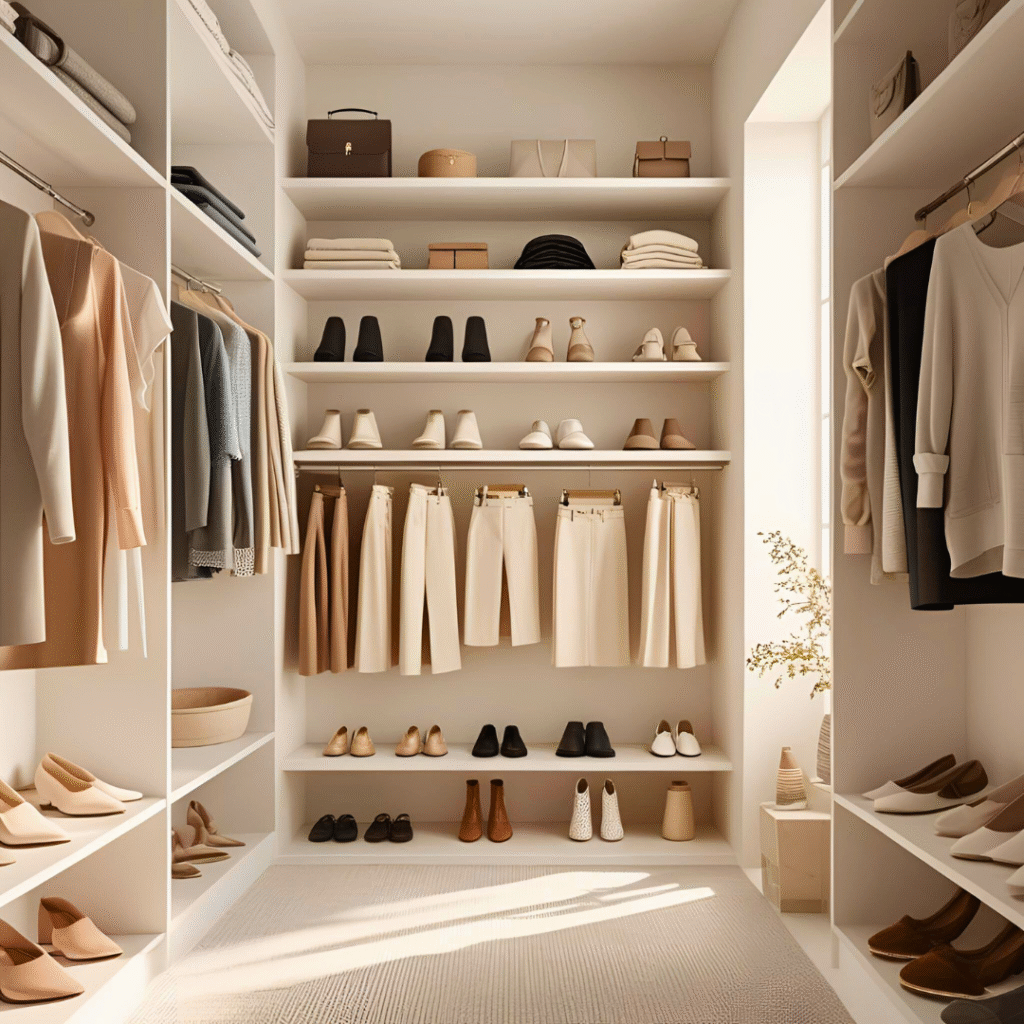
Rotate Your Clothes
Don’t wear the same pieces constantly. Give them time to rest between wears.
Address Problems Quickly
Fix small issues like loose buttons or small stains before they become bigger problems.
Store Seasonal Items Properly
Clean clothes before storing them away for the season. Use proper storage containers to protect them.
As Elle often points out, classic style is an investment in your future self – pieces that will serve you well for years to come.
The Psychology of Classic Style
There’s something strong about classic style that’s more than simply being good-looking:
Confidence
If you know you look right and put together, then you’ll feel more confident in any given circumstance.
Simplicity
Classic style abolishes decision fatigue. When your wardrobe pieces work well together, dressing is simpler.
Timelessness
You don’t mind appearing old-fashioned in pictures or feel self-conscious about past dressing decisions.
Respect
Classic style inspires respect in business and social circles. Others take you seriously.
Authenticity
Classic style allows your personality to come through without your clothing stealing the spotlight.
FAQs About Classic Style
1. Is classic style boring?
Not at all! Classic style is about choosing quality, timeless pieces that flatter you. It’s elegant and sophisticated, not boring. You can add personality through accessories, colors within your palette, and how you style pieces together.
2. How much should I spend on a classic wardrobe?
There’s no set amount because it depends on your budget and lifestyle. Focus on buying the best quality you can afford for pieces you’ll wear often. It’s better to buy fewer, higher-quality items than many cheap ones.
3. Can young women wear classic style?
Absolutely! Classic style works at any age. Young women can embrace classic pieces like well-fitted jeans, button-down shirts, and blazers while still expressing their personality through styling and accessories.
4. What’s the difference between classic and trendy?
Classic pieces never go out of style and work for multiple seasons and occasions. Trendy pieces are popular right now but will likely look dated soon. Classic style focuses on timeless appeal rather than following every trend.
5. How do I know if a piece is truly classic?
Ask yourself: Will this look good in five years? Does it have clean, simple lines? Is it well-made? Does it work with other pieces in my wardrobe? If you answer yes to these questions, it’s probably classic.
6. Can I mix classic pieces with trendy items?
Yes! The best approach is to build a foundation of classic pieces and add a few trendy accessories or items each season. This keeps your look current while maintaining timeless appeal.
7. What if classic colors don’t suit my skin tone?
While classic style often uses neutrals, you can adapt the palette to suit you. If warm beiges work better than cool grays, go with that. The key is finding neutral colors that flatter you and sticking with them.
8. How many pieces do I need for a classic wardrobe?
It depends on your lifestyle, but most people can create a functional classic wardrobe with 20-40 pieces. Quality matters more than quantity. Focus on versatile pieces that work together.
9. Is classic style suitable for all body types?
Yes! Classic style emphasizes good fit and flattering silhouettes, which work for everyone. The key is finding the classic pieces that work best for your body type and having them tailored if needed.
Conclusion
Classic style is not about being a rule-follower or pretending to be like everybody else. It’s about knowing what does work for you and spending money on pieces that will last for years to come.
The most fashionable women are not always dressed in what’s currently in fashion. They are the ones who have discovered their own personal style and adhere to high-quality pieces that make them feel good and at ease.
It does take patience and time to create a timeless wardrobe, but it is well worth it. You’ll have less time spent shopping, less time figuring out what to wear, and less money spent on garments that are instantly dated.
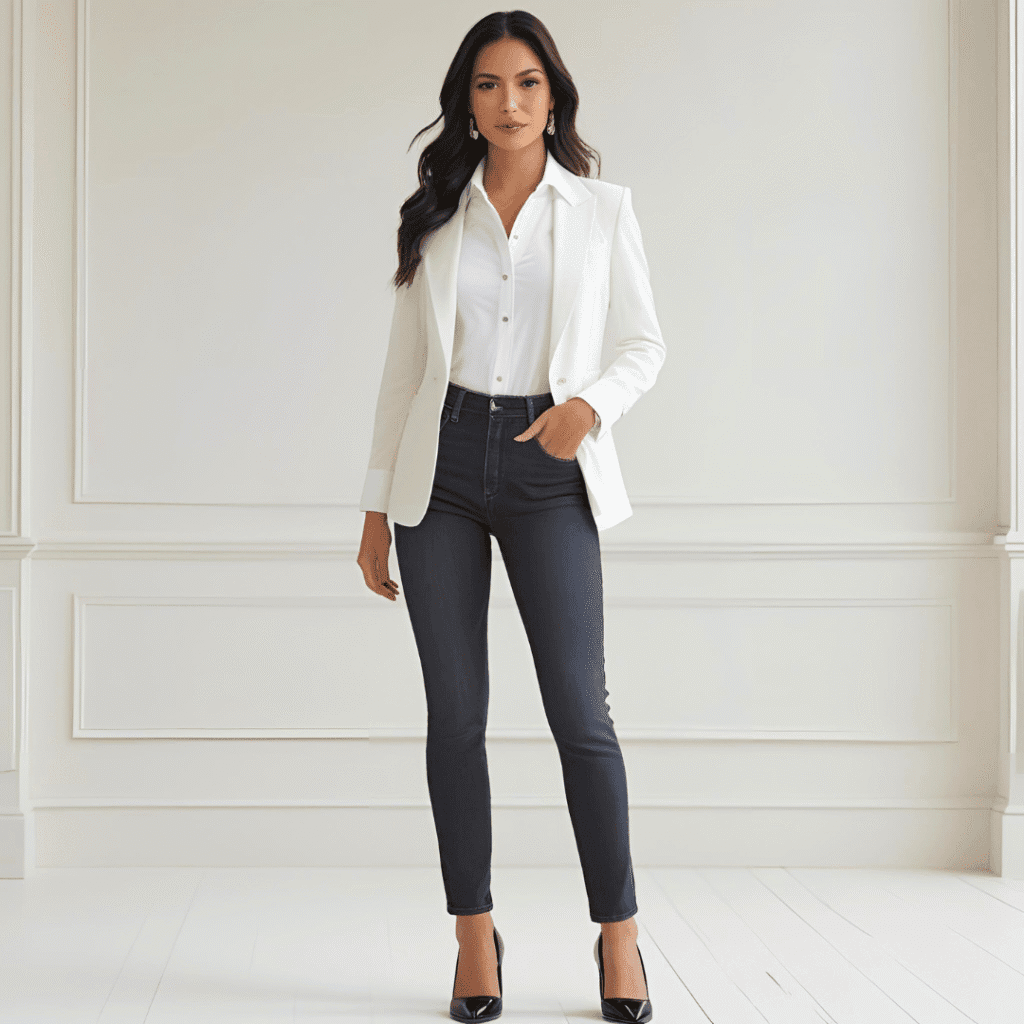
Keep in mind, classic style is not just about what you wear. It’s about putting your best self forward in the world with confidence and poise. From dressing for work, weekends, or a special event, classic pieces will never disappoint.
Begin in small steps, emphasize quality, and listen to your intuition. Before long, your closet will be filled with pieces that make you feel and look great every day.
As Forbes explains in their style guides, classic piece investing isn’t about fashion – it’s about creating a wardrobe that aligns with your professional and personal aspirations for years to come.
The glory of classic style is that it’s forever fitting, forever elegant, and always you. That never goes out of style.
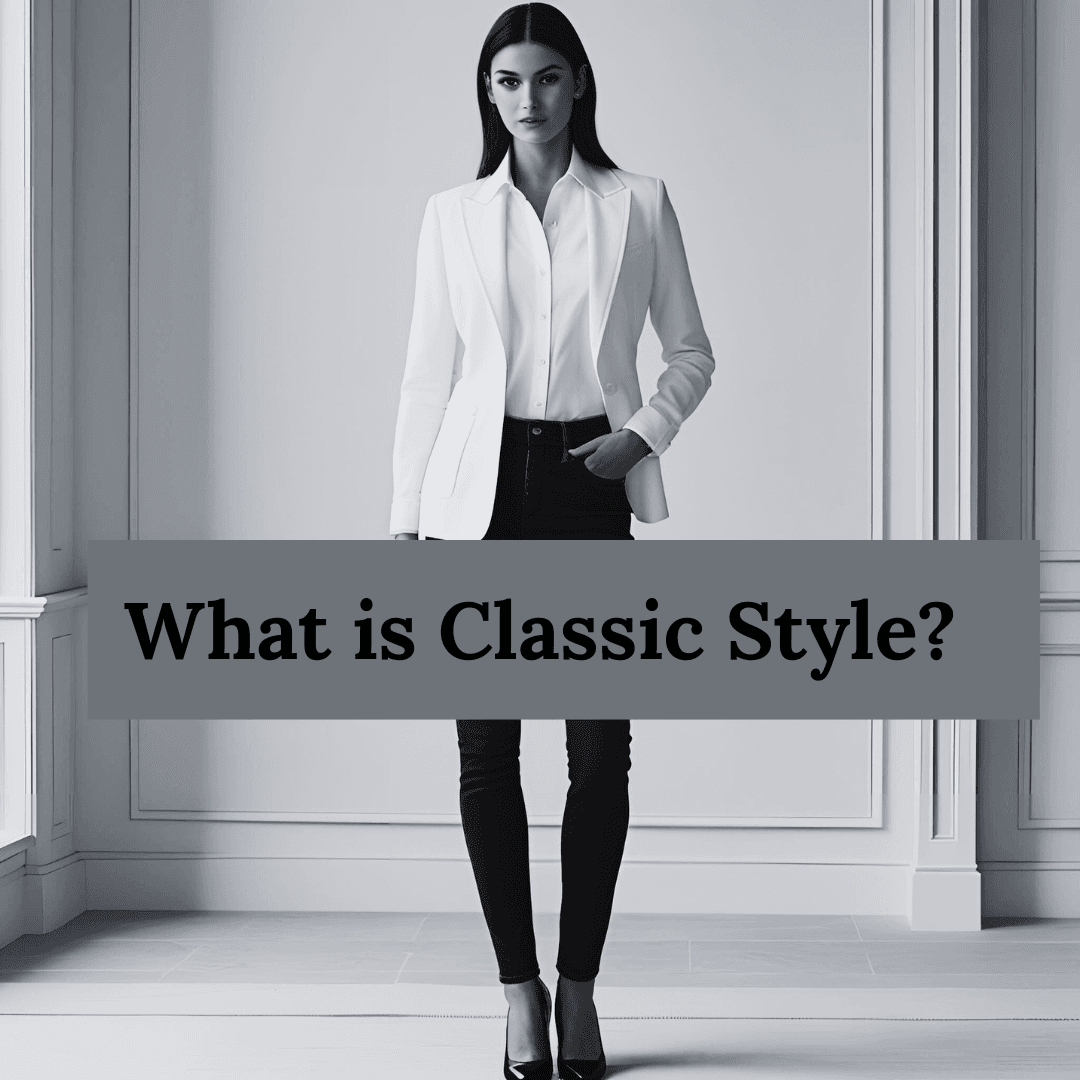
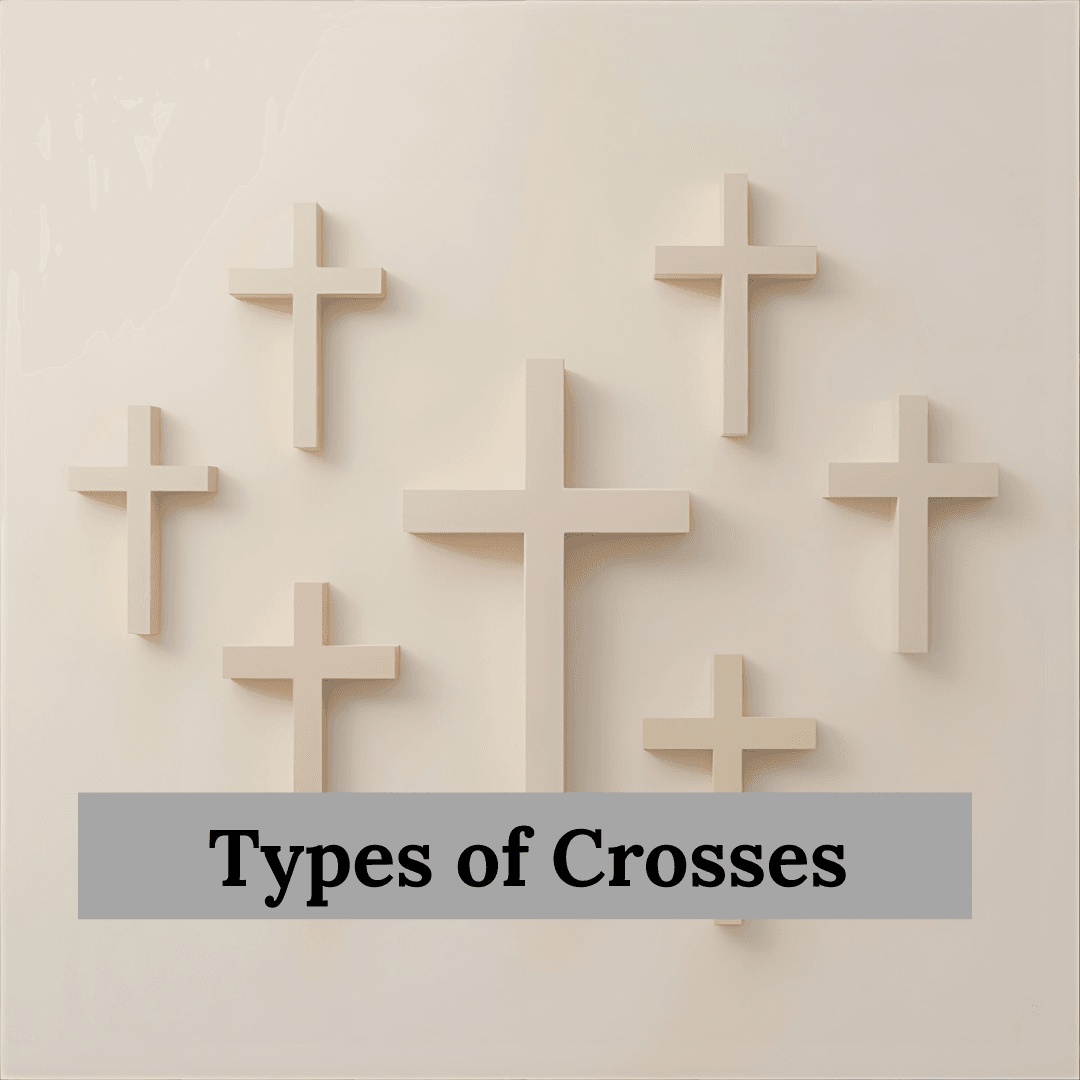

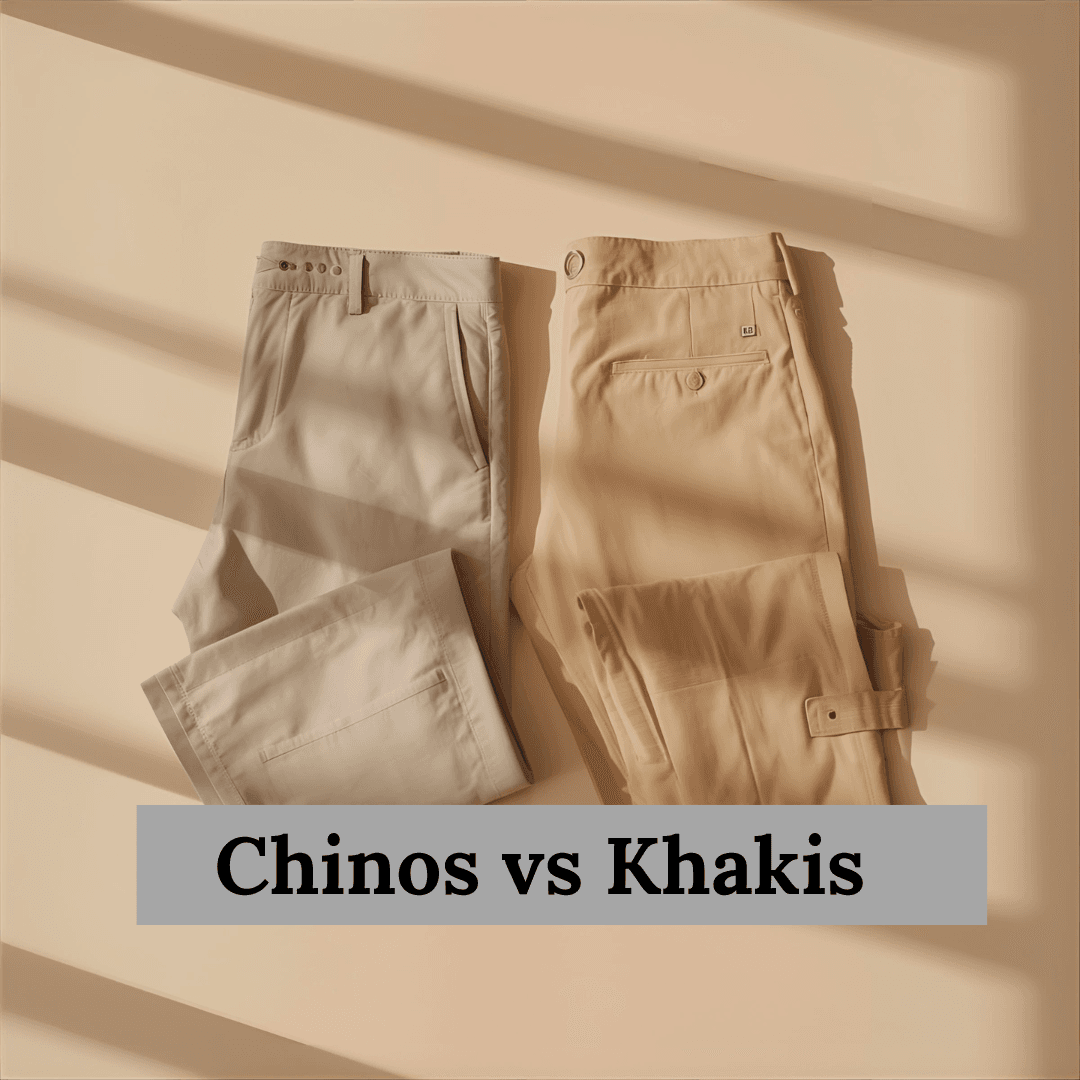




Leave a Reply